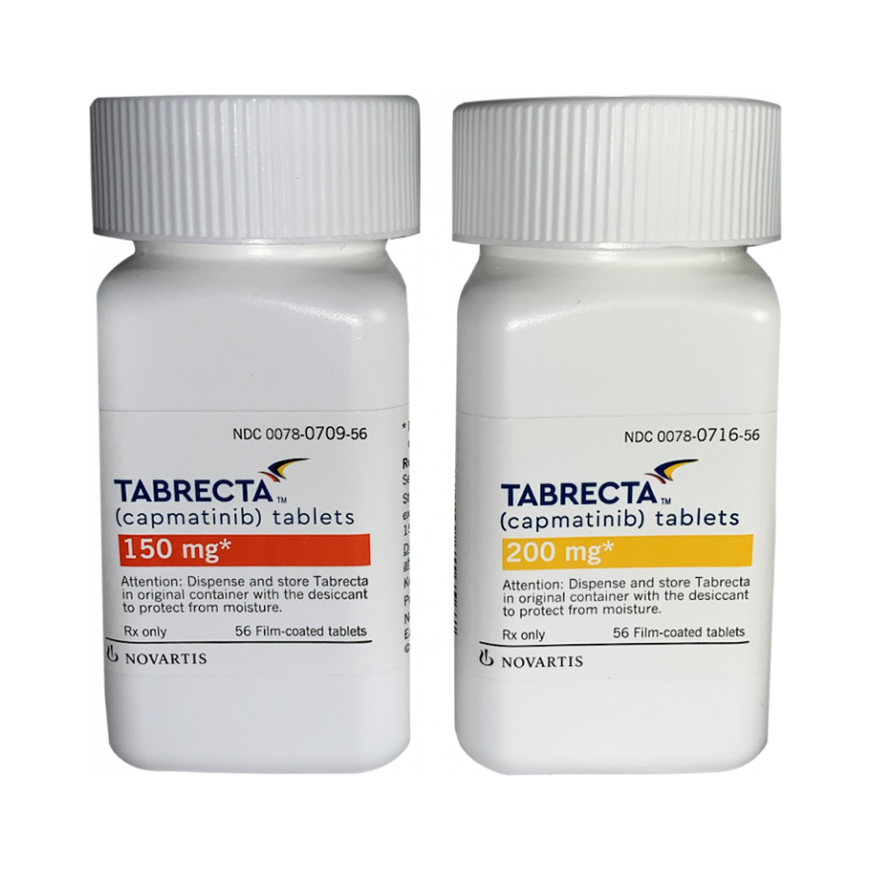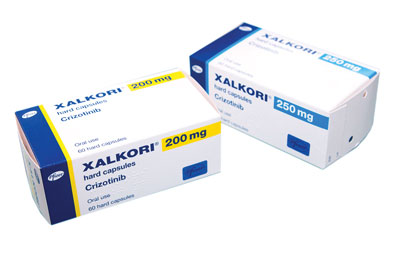Tabrecta (capmatinib) vs Xalkori (crizotinib)
Tabrecta (capmatinib) vs Xalkori (crizotinib)
Tabrecta (capmatinib) is specifically approved for the treatment of adult patients with non-small cell lung cancer (NSCLC) that has a mutation leading to MET exon 14 skipping, and its effectiveness is particularly focused on tumors with this genetic alteration. Xalkori (crizotinib), on the other hand, is used to treat NSCLC with ALK (anaplastic lymphoma kinase) or ROS1 (c-ros oncogene 1) positive tumors, targeting different genetic drivers of cancer. When deciding between these two medications, it is crucial for a patient to undergo genetic testing to determine the presence of MET exon 14 skipping mutations for Tabrecta or ALK/ROS1 mutations for Xalkori, as the efficacy of each drug is highly dependent on these specific genetic alterations.
Difference between Tabrecta and Xalkori
| Metric | Tabrecta (capmatinib) | Xalkori (crizotinib) |
|---|---|---|
| Generic name | Capmatinib | Crizotinib |
| Indications | Metastatic non-small cell lung cancer (NSCLC) with MET exon 14 skipping mutations | NSCLC with ALK or ROS1 genetic alterations, and anaplastic large cell lymphoma |
| Mechanism of action | MEK inhibitor | ALK and ROS1 receptor tyrosine kinase inhibitor |
| Brand names | Tabrecta | Xalkori |
| Administrative route | Oral | Oral |
| Side effects | Peripheral edema, nausea, fatigue, vomiting, dyspnea, and decreased appetite | Visual problems, nausea, diarrhea, vomiting, edema, constipation, elevated transaminases, fatigue, decreased appetite |
| Contraindications | Hypersensitivity to capmatinib or any of its excipients | Hypersensitivity to crizotinib or any of its components, hepatic impairment |
| Drug class | Kinase inhibitor | Kinase inhibitor |
| Manufacturer | Novartis Pharmaceuticals Corporation | Pfizer Inc. |
Efficacy
Tabrecta (Capmatinib) and Its Efficacy in Treating Lung Cancer
Tabrecta (capmatinib) is a targeted therapy approved by the FDA for the treatment of adult patients with non-small cell lung cancer (NSCLC) that has spread to other parts of the body (metastatic) and whose tumors have an abnormal mesenchymal-epithelial transition (MET) gene. The efficacy of Tabrecta was evaluated in a clinical trial that focused on patients with NSCLC harboring MET exon 14 skipping mutations. In this trial, patients demonstrated a significant response rate to the treatment, indicating that Tabrecta can effectively inhibit tumor growth and reduce the size of the tumors in a subset of lung cancer patients with this specific genetic alteration.
The response to Tabrecta is particularly noteworthy as MET exon 14 skipping mutations are a recognized driver in NSCLC, and patients with this mutation typically have limited treatment options. The clinical trial results showed that the overall response rate (ORR) was substantial among treated patients, with many experiencing a partial or complete response to the therapy. The duration of response (DOR) also underscored the potential of Tabrecta as a meaningful treatment for this patient population, with some responses lasting for a year or more.
Xalkori (Crizotinib) and Its Efficacy in Treating Lung Cancer
Xalkori (crizotinib) is another targeted therapy that has been approved for the treatment of NSCLC, specifically for patients whose tumors are anaplastic lymphoma kinase (ALK) or ROS1-positive. Crizotinib has been shown to be highly effective in patients with ALK-positive NSCLC, with significant improvements in progression-free survival compared to standard chemotherapy in clinical trials. The ORR for crizotinib in treating ALK-positive lung cancer is impressive, with many patients experiencing tumor shrinkage or disease stabilization.
For patients with ROS1-positive NSCLC, crizotinib has also demonstrated a high ORR, providing a critical treatment option for this subset of lung cancer patients. The efficacy of Xalkori in both ALK and ROS1-positive NSCLC highlights its role as a cornerstone in the management of these genetically defined types of lung cancer. The impact of crizotinib on overall survival, progression-free survival, and quality of life has established it as a standard of care for patients with ALK or ROS1-positive metastatic NSCLC.
Regulatory Agency Approvals
Tabrecta
-
European Medical Agency (EMA), European Union

-
Food and Drug Administration (FDA), USA

-
Pharmaceuticals and Medical Devices Agency (PMDA), Japan

Xalkori
-
European Medical Agency (EMA), European Union

-
Food and Drug Administration (FDA), USA

-
Health Canada

-
Pharmaceuticals and Medical Devices Agency (PMDA), Japan

-
Therapeutic Goods Administration (TGA), Australia

Access Tabrecta or Xalkori today
If Tabrecta or Xalkori are not approved or available in your country (e.g. due to supply issues), you can access them via Everyone.org.
How it works

Make an enquiry
Choose the medicine you want to buy, answer a couple of questions, and upload your prescription to speed things up. We’ll get back to you within 24 hours.


Make an enquiry
Choose the medicine you want to buy, answer a couple of questions, and upload your prescription to speed things up. We’ll get back to you within 24 hours.


Breeze through the paperwork
We'll guide you through the required documents for importing unapproved medicine, ensuring you have all the necessary information.


Get a personalized quote
We’ll prepare a quote for you, including medicine costs and any shipping, administrative, or import fees that may apply.


Receive your medicine
Accept the quote and we’ll handle the rest - sourcing and safely delivering your medicine.

Some text on this page has been automatically generated. Speak to your physician before you start a new treatment or medication.
Let's talk
If you have any questions, call us or send us a message through WhatsApp or email:
Contact us




